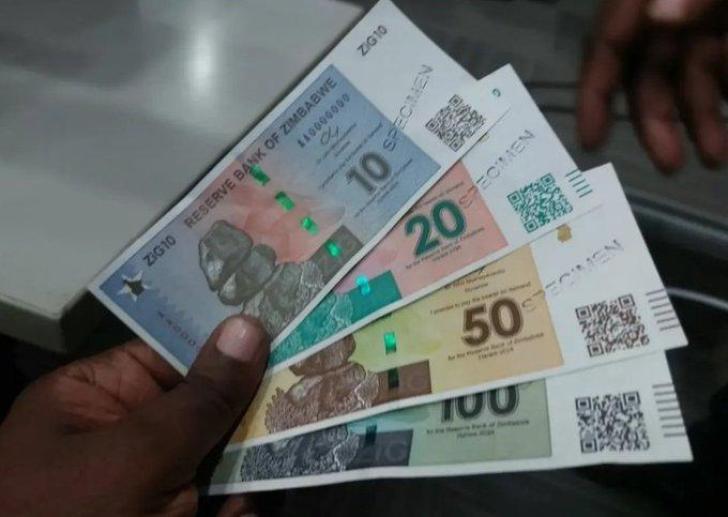News / National
ZiG struggles persist
15 Oct 2024 at 07:39hrs |
0 Views

The woes surrounding the Zimbabwe Gold (ZWG) currency show no signs of abating, as retailers continue to implement a three-tier pricing system for products, complicating consumer transactions and undermining confidence in the local currency.
Introduced on April 5, 2024, as a long-term solution to Zimbabwe's currency challenges, the ZWG initially performed well in its first four months. However, its value significantly declined as the parallel market exchange rates surged to as high as US$1: ZWG 30, compared to a premium of ZWG 13.80 on the official market. In response to this widening gap, the Central Bank intervened by devaluing the ZWG by 43% and raising interest rates to curb speculative borrowing.
Although these measures have reduced exchange rate volatility, a recent visit by the NewZimbabwe.com news crew to several retail outlets in Harare's Central Business District revealed that challenges associated with the ZWG remain prevalent. Retailers are still demanding payment in US dollars for specific products and maintaining a pricing strategy that differentiates based on payment method.
For example, Colgate Maxfresh toothpaste is sold exclusively in US dollars at Food World supermarket. Other products, such as Rabroy Tomato Sauce, are priced at US$1.10 when paid in ZWG, USD, or cash, but rise to US$1.25 for swipe transactions. Similarly, a 330 ml can of Coke is priced at US$0.64 for ZWG or cash payments and US$0.88 for swipe transactions.
Customers have expressed frustration over these pricing structures, which they believe create a significant disconnect between their salaries and the costs of goods. "Such pricing structures leave us desperate as customers because when we receive our salaries, we are not enjoying any such benefits since we are paid at a flat rate," lamented one shopper at Food World Supermarket. "Authorities must urgently act on these anomalies because they provide a sound basis for deducting confidence in the currency."
Moreover, some retailers are restricting the number of products available for purchase in ZWG and complicating local currency transactions, further exacerbating consumer frustration. This ongoing situation raises concerns about the effectiveness of the ZWG and its ability to stabilize the economy, prompting calls for immediate intervention by authorities to address these disparities and restore public confidence in the currency.
Introduced on April 5, 2024, as a long-term solution to Zimbabwe's currency challenges, the ZWG initially performed well in its first four months. However, its value significantly declined as the parallel market exchange rates surged to as high as US$1: ZWG 30, compared to a premium of ZWG 13.80 on the official market. In response to this widening gap, the Central Bank intervened by devaluing the ZWG by 43% and raising interest rates to curb speculative borrowing.
Although these measures have reduced exchange rate volatility, a recent visit by the NewZimbabwe.com news crew to several retail outlets in Harare's Central Business District revealed that challenges associated with the ZWG remain prevalent. Retailers are still demanding payment in US dollars for specific products and maintaining a pricing strategy that differentiates based on payment method.
For example, Colgate Maxfresh toothpaste is sold exclusively in US dollars at Food World supermarket. Other products, such as Rabroy Tomato Sauce, are priced at US$1.10 when paid in ZWG, USD, or cash, but rise to US$1.25 for swipe transactions. Similarly, a 330 ml can of Coke is priced at US$0.64 for ZWG or cash payments and US$0.88 for swipe transactions.
Customers have expressed frustration over these pricing structures, which they believe create a significant disconnect between their salaries and the costs of goods. "Such pricing structures leave us desperate as customers because when we receive our salaries, we are not enjoying any such benefits since we are paid at a flat rate," lamented one shopper at Food World Supermarket. "Authorities must urgently act on these anomalies because they provide a sound basis for deducting confidence in the currency."
Moreover, some retailers are restricting the number of products available for purchase in ZWG and complicating local currency transactions, further exacerbating consumer frustration. This ongoing situation raises concerns about the effectiveness of the ZWG and its ability to stabilize the economy, prompting calls for immediate intervention by authorities to address these disparities and restore public confidence in the currency.
Source - NewZimbabwe
Join the discussion
Loading comments…




































